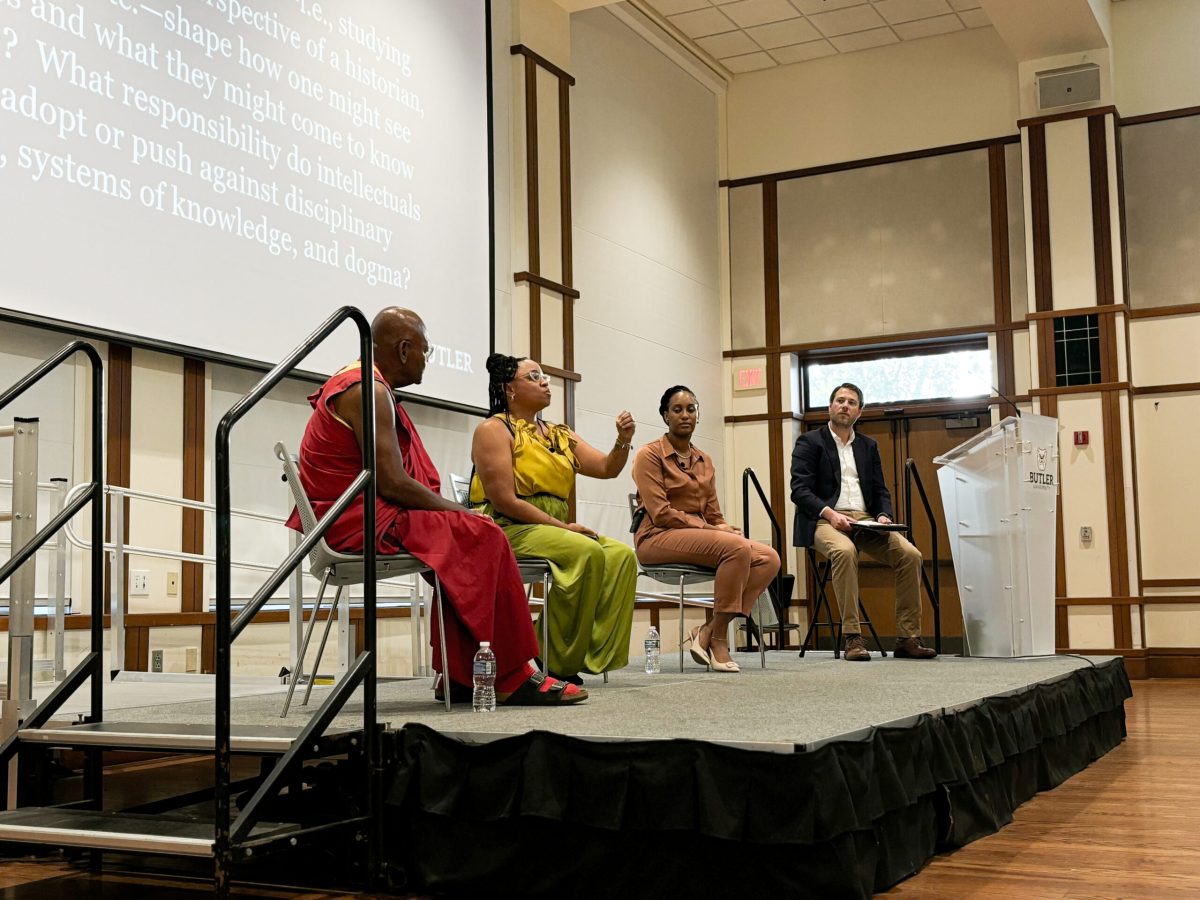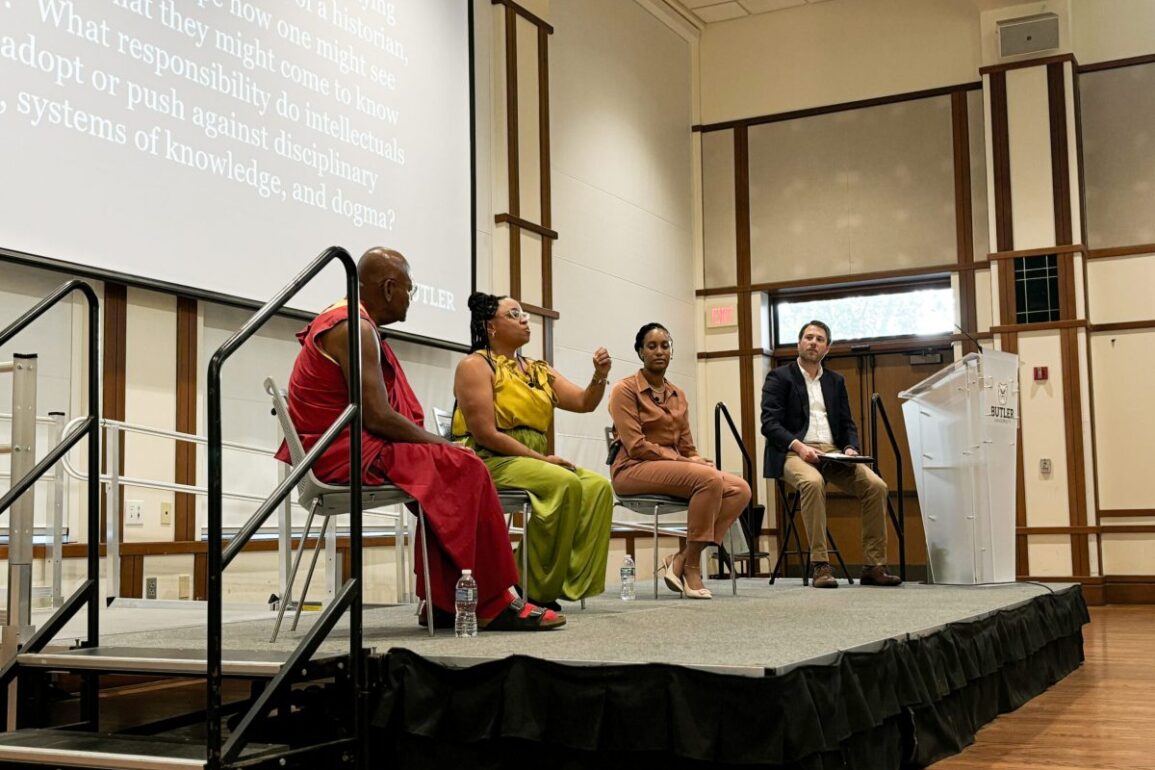
A discussion panel facilitated by, from left to right, Dr. Leon Pettiway, Dr. Charlene Fletcher, Dr. Tri Keah Henry, Dr. Stephen Barnard. Photo by Katerina Anderson.
MOLLY DURM l STAFF REPORTER l mdurm@butler.edu
Butler University hosted a thought-provoking panel discussion titled “Rethinking Race, Crime and Justice” where experts explored the deep-rooted inequities in the U.S. criminal justice system and called for transformative reforms. The panel was hosted by the Department of Sociology and Criminology, the Hub for Black Affairs and Community Engagement and the Efroymson Diversity Center.
Multiple experts led the discussion, including assistant professor of history Charlene Fletcher, Tri Keah Henry, an assistant professor of criminal justice at Indiana University, and the Venerable Lobzang Dorje, Dr. Leon Pettiway, an emeritus professor of criminal justice at Indiana University.
The panelists discussed the connection between a racialized world and the criminal justice system and revealed their ideas for transformative change. The discussion was loosely based on Pettiway’s recent book, “Only for the Brave at Heart”.
Stephen Barnard, an associate professor of sociology and criminology, organized and moderated the panel discussion. Barnard was driven to organize this event to increase student involvement in these important conversations, drawing inspiration from the release of Pettiway’s new book.
“[Pettiway’s book] uses terminology that’s meant to evoke emotion,” Barnard said. “It is written through an expression of Buddhist principles … He ties our understanding of race to a Eurocentric frame … He’s making the claim that we all need to rethink so many of the systems in our society including race, gender, institutions and academic disciplines.”
The questions also sparked thoughtful discussion about the intersection of systemic issues in today’s society and carceral systems, while engaging the diverse perspectives and experiences of each panelist.
Barnard emphasized that the solution to an inequitable system must involve the community as a whole.
“We’re not just talking about the laws, or the police or the jails and prisons,” Barnard said. “[When] we’re talking about the system of inequality that creates all of these other things that then lead to crime, you can’t separate one piece of it.
Furthermore, Barnard believes in a collectivist approach to harm reduction, something that is inherently countercultural.
“The restorative justice model that was discussed suggests that harm happens at the communal level, therefore repair has to happen at the communal level, and that requires a whole different frame of reference,” Barnard said.
The longstanding inequalities upheld within and by America’s criminal justice system were explored during the discussion.
First-year biology major Macie Bull highlighted the economic dimensions of incarceration that stood out to her.
“I really enjoyed Dr. Fletcher’s take on prison,” Bull said. “I especially [enjoyed] hearing about the return on [investment] point of view and how we’re not putting money into people getting educated and staying out of prison. Instead, the quicker way for our government to get money is to put people in these prisons and [keep] them in for longer.”
The panel of experts stressed the need for reform in the American justice system, emphasizing how the intersection of race, crime and justice perpetuates systemic inequities.
First-year criminology-psychology major Ada Kitch, reflected on the shortcomings of the criminal justice system, highlighting how individuals are often pushed through an ineffective cycle of incarceration.
“It’s interesting to think about [the criminal justice system] from the perspective of how we can reform it,” Kitch said. “We push people through the system: you’re in jail, then you’re in this house for a couple months, then this recovery house, and then you’re back out, and then you can just relapse again; it’s just a never-ending cycle.”
The panelists reframed the concept of justice, emphasizing that justice is not synonymous with punishment. They asserted that a punitive approach is insufficient for true justice. Attendees found the conversation not only thought-provoking but highly relevant to the Indianapolis community.
“I think it’s super important to discuss, especially in a city,” Bull said. “I think Indy is seen as a crime hub and it’s really important to think from a different perspective and not just ‘We need to get all these people in jail.’ We really need to figure out how to prevent this crime, and sometimes preventing crime isn’t just locking every person in sight in jail, sometimes it’s trying to reform the system and reform their lives.”
Barnard also emphasized the relevance of the discussion in today’s climate, noting how critical these topics are in shaping societal progress.
“We live in a society where those issues are very prevalent and important,” Barnard said. “The ultimate goal was to have a smattering of different but related perspectives in conversation and allow the audience to hear the panelists speak about their experiences and their perspectives which are multifaceted, but intersecting in various ways and I think it was very successful in that.”
The panel discussion provided a platform for experts and students to examine the inequities in the U.S. criminal justice system and explore the intersection of race and crime. By bringing attention to the need for reform, the conversation inspired attendees to think beyond punishment and consider how societal change can begin at the local level.
This post was originally published on this site be sure to check out more of their content.







